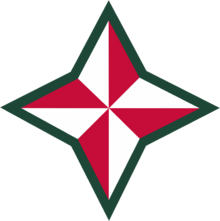48th Armored Division
| 48th Armored Division | |
|---|---|
|
Shoulder sleeve insignia | |
| Active |
1946–55 (48th Infantry Division) 1955–68 (48th Armored Division) |
| Country |
|
| Branch |
|
| Type | Armor |
| Role | Armored warfare |
| Size | Division |
| Garrison/HQ | Jacksonville, Florida |
| Nickname | "Hurricane" |
| U.S. Armored Divisions | |
|---|---|
| Previous | Next |
| 40th Armored Division (Inactive) | 49th Armored Division (Inactive) |
The 48th Armored Division was a division of the United States Army National Guard from September 1946 until 1968. Most of its units were part of the Florida Army National Guard and the Georgia Army National Guard. From 1946 to 1955 it was an infantry division. During World War II the denotation 48th Infantry Division was used for a deceptive formation created for Operation Quicksilver, part of Operation Fortitude South II.



48th Division of the National Guard
The 48th "Hurricane" Infantry Division was formed on 15 September 1946 of Florida and Georgia National Guardsmen. The division conducted its first annual training from 18 July to 1 August 1948 at Fort Jackson.[2]
Organization on September 15th, 1946[3]
| Unit | Headquartered | Commander |
|---|---|---|
| Division Headquarters | Jacksonville, Florida | |
| 124th Infantry Regiment | Jacksonville, Florida | Col. Maxwell C. Snyder |
| 121st Infantry Regiment | Georgia | |
| 149th Field Artillery Battalion | Lakeland, Florida | Lt. Col. Milton E. Hull |
The 124th Infantry Regiment of the Florida ARNG was assigned on 5 July 1946 to the 48th Infantry Division. It was broken up on 1 November 1955 and its elements, the 124th Armored Infantry Battalion and the 154th Armored Infantry Battalion were both assigned to the 48th Armored Division. The 124th and 154th Armored Infantry Battalions were consolidated 15 April 1959 to form the 124th Infantry, a parent regiment under the Combat Arms Regimental System, to consist of the 1st and 2d Armored Rifle Battalions, elements of the 48th Armored Division.
"To prepare for challenges in Western Europe, the new troop basis authorized the conversion of four National Guard infantry divisions to armored divisions."[4] Georgia, and Florida agreed to convert and on 1 November 1955 the 48th Division was redesignated as an armored division. When the 51st Infantry Division was inactivated in 1963, some of its units, both from Florida and South Carolina, were assigned to the 48th Armored Division. On October 1, 1957 the 48th Armored Division headquarters was transferred from Macon, Georgia to Jacksonville, Florida as Major General Maxwell Snyder took command.
When the Army National Guard experienced its next major reorganization in 1967, the 48th Armored Division was chosen for inactivation, which occurred on 1 January 1968.
Soldiers and units in Florida were assigned to the 53rd Infantry Brigade Combat Team. The number "48" was carried on by the Georgia National Guard and is today the 48th Infantry Brigade Combat Team.
WW II deception formation
The 48th Infantry Division was 'created' in 1944 as an imaginary 'deception' formation. It formed part of Operation Quicksilver and Fortitude South II to replace the real 6th Armored Division when it moved to Normandy.[5][6]
The division was presented to the Germans as a well trained unit that had been formed at Camp Clatsop, Oregon in 1942. Following training at the Desert Training Center and maneuvers in the Olympic Peninsula the division had guarded the ALCAN Highway before being shipped to England in June 1944, where Agent Garbo reported that the uncle of one of his agents (An American NCO in the ETO Services of Supply.[7]) was a member of the division, which was not at the time he made the report under the command of either the First US Army Group or the 21st Army Group.[6][8] After disembarkation, the division established its initial headquarters at Newcastle-under-Lyme in Staffordshire before moving to Woodbridge in Suffolk.[6] There, as part of the U.S. XXXIII Corps (United States) of the US 14th Army it was assigned the role of following up the Pas de Calais landings.[9]
Following Fortitude South II the division was depicted as moving to Brockenhurst in Hampshire where it carried out air landing training in conjunction with the US 21st Airborne Division. In December 1944 the division was depicted as moving to Dundee in Scotland where it was disbanded at the start of 1945, with some soldiers being used as replacements for other units while a small cadre returned to the United States.[6]
In addition to the usual divisional support units the 48th Infantry Division was presented as including the:[6]
- 80th Infantry Regiment
- 95th Infantry Regiment
- 146th Infantry Regiment
Notes
- ↑ The Institute of Heraldry
- ↑ Lance, Mark (1948). Report of the Adjutant General of the State of Florida, 1947-1948. Florida National Guard. p. 9.
- ↑ Collins, Vivian (1946). Report of the Adjutant General of the State of Florida. Florida National Guard. p. 11.
- ↑ Wilson, John B. 1998. Maneuver and Firepower: The Evolution of Divisions and Separate Brigades. Washington, D.C. Center for Military History
- ↑ Hesketh (1999). p. 244.
- ↑ 6.0 6.1 6.2 6.3 6.4 Holt (2005). p. 906.
- ↑ Harris (2000). p. 312.
- ↑ Hesketh (1999). p. 251.
- ↑ Hesketh (1999). p. 418.
References
- Holt, Thaddeus. The Deceivers: Allied Military Deception in the Second World War. Phoenix. 2005. ISBN 0-75381-917-1
- Hesketh, Roger. Fortitude: The D-Day Deception Campaign. St Ermin's Press. 1999 ISBN 0-316-85172-8
- Harris, Tomás & Seaman, Mark. Garbo: The Spy Who Saved D-Day. Public Record Office. 2000. ISBN 1-873162-81-2
| ||||||||||||||||||||||||||||||||||||||||||||||||||||||||||||||||||||||||||||||||||||||||||
External links
- "Chapter XIII: The Total Army". 'Manoeuvre and Firepower: The Evolution of Divisions and Separate Brigades'. Army Lineage Series. United States Army Center of Military History. 1998. 60-14.
